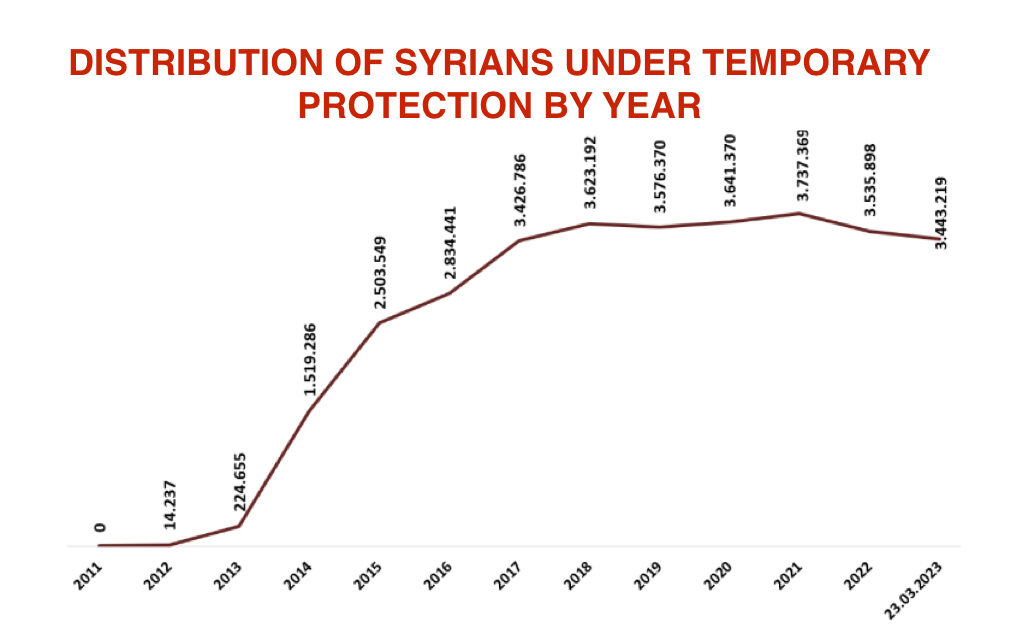Levent Kenez/Stockholm
In the presidential and parliamentary elections scheduled for May 14, 60,904,499 voters will be able to cast votes at 190,736 polling places across Turkey. In addition, 3,286,786 people will be able to vote from abroad. However, there are conflicting stories in the Turkish media about how many voters are immigrants who later became Turkish citizens. The opposition accuses the government of granting citizenship to Syrian, Afghan and Iranian immigrants and refugees in order to gain an advantage in the elections. It is likely to predict that new citizens will overwhelmingly support the government of President Recep Tayyip Erdoğan in the elections due to the negative view of opposition parties toward immigrants.
In August 2022 Interior Minister Süleyman Soylu announced that there were 120,000 voters of Syrian origin in Turkey and that 211,000 Syrians under temporary protection had acquired citizenship, adding that 91,000 new citizens were under the age of 18 and therefore ineligible to vote.
A statement made by the Ministry of Interior on December 19, 2022 said 126,786 Turkish citizens of Syrian origin have the right to vote in a possible election.

Onursal Adıgüzel, vice chairman of Turkey’s main opposition Republican People’s Party (CHP) in charge of electoral affairs, said some 170,000 Syrians have registered to vote. When the new Turkish citizens of Iranian, Iraqi, Libyan or Afghan origin are taken into account, that number jumps to 240,000, he said.
However, it is not yet known exactly how many Syrian-Turkish citizens are on the latest voter lists, which will be available to political parties and private citizens until April 2.
Adıgüzel is of the opinion that not as many Syrians as nationalist circles claim have been granted citizenship, but he says the government is not transparent, either. Some opponents blame Adıgüzel for the fact that the software installed by the CHP for the security of the 2018 presidential election crashed a few hours after the polls closed, claiming that Adıgüzel is not the right person to trust. It also turned out that the CHP had no observers at 12,000 polling places.
Under Turkish law a person can vote in the first elections to be held after he or she becomes a citizen. The opposition claims that citizenship registrations are made with common Turkish names so that Syrians who are Turkish citizens do not attract too much attention. For this reason, the place of birth is checked first in the election records by the opposition.
Last year, the government allowed citizens the right to change their names on the government website e-Government, where citizens’ information is stored. The opposition claimed at the time that it was to allow Syrians the opportunity to change their Arabic names to Turkish ones. In order to change a name in Turkey, a person has to file a petition with the court.
A story that recently appeared in the Turkish media claimed that there were 466,000 Syrian-born voters in the records of the Supreme Election Board (YSK). While the YSK strongly denied this, it said the electoral registers are regularly shared with political parties. However, a detailed analysis of the newly announced lists by the parties has not yet been completed.
Whether the votes of citizens of Syrian and Afghan origin can affect the election results is also a matter of debate. There are experts who claim that it will not have a serious effect in an election in which there are 60 million voters. However, while opposition officials say the number of new citizens has not yet been confirmed, they remind that both the government and the opposition are making efforts to cooperate with parties that have a much smaller number of voters. For example, President Erdoğan is cooperating with the Free Cause Party (HÜDA-PAR), the political wing of the Iranian-backed Turkish Hizbullah. HÜDA-PAR received only 155,000 votes in the 2018 elections. An Erdoğan ally, the ultranationalist Vatan (Homeland) Party of Doğu Perinçek received only 114,872 votes in the 2018 elections.
Some claim that the new citizens will have an impact in the parliamentary elections in provinces densely populated by Syrian migrants, such as Hatay and Gaziantep.
Turkey traditionally does not grant immigrant status to refugees. No matter how long they stay or work in Turkey, very few can become citizens and only their residence permits are extended. Nordic Monitor previously reported that Afghans are now buying an increasing number homes in order to acquire citizenship or residence permits thanks to a real estate campaign to encourage the sale of housing to foreigners to meet Turkey’s foreign exchange needs.












